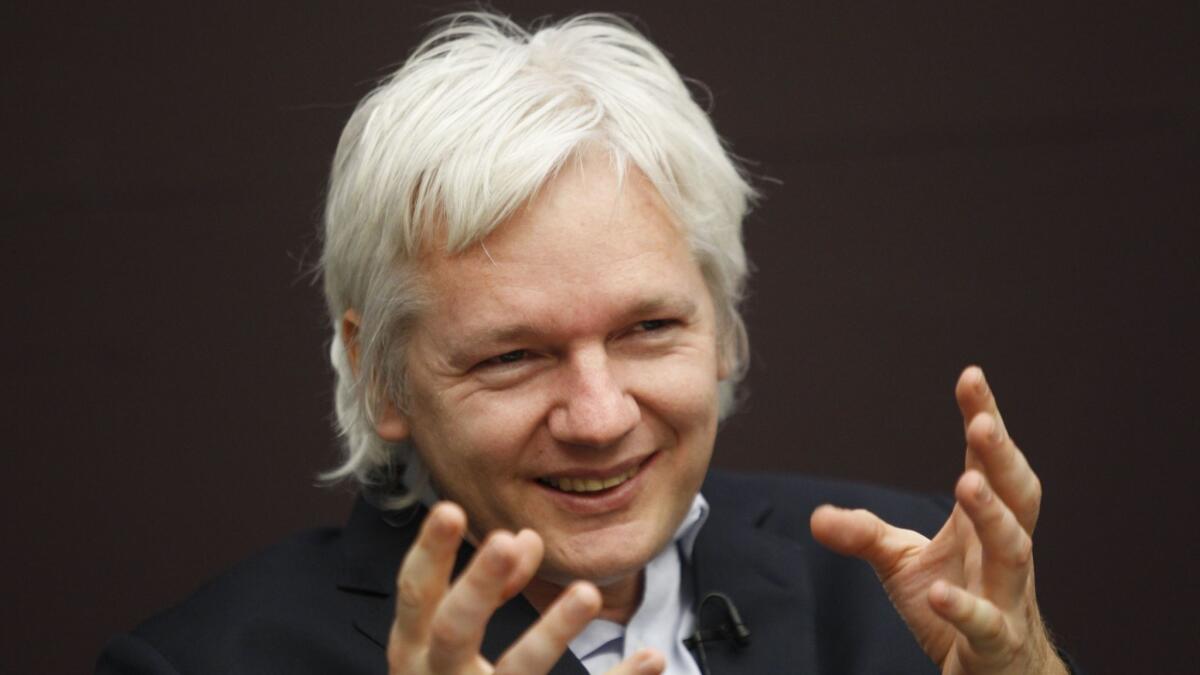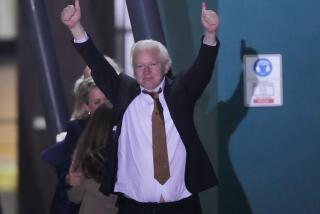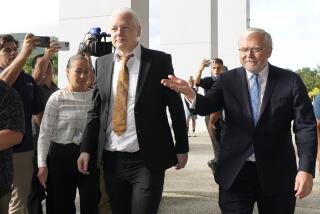Column: Julian Assange, the hacker hacked

- Share via
On Thursday in London, it was almost as though the metropolitan police, working with the Ecuadorian government, had hacked into Julian Assange’s private space and exposed him and his secrets to disinfecting sunlight. (Literally disinfecting: Assange’s lax personal hygiene has troubled the embassy staff for years.)
Assange was freed by force from the embassy redoubt he despised and defiled for seven years. The breakup should have been mutual, but no. An oatmeal-colored Assange — he seems to have made little use of the sunlamp and treadmill the embassy generously furnished for him — left his digs at 3 Hans Crescent kicking and screaming. And manacled.
The video of his arrest ricocheted around the internet. Somehow WikiLeaks itself, which usually loves the spectacle of hubris brought low, failed to publish it.
Assange now faces skipped-bail charges in the UK, as well as the possibility of extradition to the United States, where he has been indicted for alleged computer crimes — specifically, having helped U.S. Army intelligence analyst Chelsea Manning break into government computers in 2010.
Exposing injustice was never Assange’s end.
Though a prodigy programmer who has worked as a hacker for three decades, Assange, through his lawyers, now maintains that when he collaborated with Manning he was nothing but a journalist working a source, presumably one entitled to constitutional protections.
It should not be lost in the inevitable portrayal of Assange as a 1st Amendment martyr that he originally sought asylum from Ecuador not because of computer meddling but because of allegations that he had committed rape in Stockholm. Sweden, stymied by the protection offered him in the embassy, stopped pursuing the investigation in 2017; on Friday, the chief prosecutor said the case could be reopened.
Assange never claimed with any consistency that the sex-crime charges were trumped up by the global enemies of freedom. Instead, he affected irritation. He denied being a rapist but he admitted in his autobiography to being a “male chauvinist pig.” His Swedish accusers were bitter, he said, because he had spurned them. His ideology seems to include overman privilege with women as a sacred civil liberty.
Early on, when Assange was winning prizes from Amnesty International for exposing war crimes, he had a certain Byronic allure. Young men, after all, make good punks. They’re feral, light on their feet, indifferent to others.
But few can carry off the pose past 40. Even swashbucklers like Assange get tired and scared, often very tired and scared, and seek the protections of other institutions — family life in the case of the gentrified punk or, in Assange’s case, a prison of his own making until he wore out his welcome.
Assange styles himself as especially irritated by incarceration because he is someone who, in his words, “has tried to give others liberty all their adult life.” But did he try to spread liberty around, or to destroy it?
When Assange staged then-vice-presidential candidate Sarah Palin’s hacked Yahoo emails on WikiLeaks in 2010, he brought transparency to exactly nothing. The emails were banal and clerical, but he framed them as exposés and a testament to his own holy audacity. All the hacked emails did was help humiliate Palin, with the single goal of trapping her in fear and demonstrating that American institutions were at his mercy.
As Palin wrote on Facebook at the time, “Violating the law, or simply invading someone’s privacy for political gain, has long been repugnant to Americans’ sense of fair play. As Watergate taught us, we rightfully reject illegally breaking into candidates’ private communications for political intrigue in an attempt to derail an election.”
With those words, Palin predicted Assange’s far more consequential 2016 move: WikiLeaks wrangled and published the equally banal emails of then-presidential-candidate Hillary Clinton, which had been hacked, according to U.S. intelligence, by the Russian military expressly “for political intrigue in an attempt to derail an election.”
When mainstream media credulously published Assange’s campaign against Clinton as if it were newsworthy, he showed he could control the fate of one party’s candidate — and, moreover, that he had the news business and social media in his thrall.
Back in 2006, Assange justified the wholesale dumping of leaked material this way: “The more secretive or unjust an organization is, the more leaks induce fear and paranoia in its leadership.”
Garbage logic. Hacks and leaks are universally frightening, no matter the moral status of the people or entities that have been stripped bare. Neither Palin nor Clinton had dastardly secrets in their inboxes or sent mail, but never mind. Assange’s spiteful hazing — pulling down peoples’ pants to reveal, shocker, their underwear — is a violation almost no one is immune to.
Exposing injustice was never Assange’s end. It was, instead, to promote exactly the kind of panic that he could then argue, tautologically, was proof that those he had targeted were corrupt and deserved it.
Enter the Fray: First takes on the news of the minute »
Perhaps now Assange the self-styled “pig” recognizes that he, too, deserves it. As he was dragged out of his once-safe haven Thursday, Wikileaks’ leader certainly looked fearful and paranoid.
Assange’s 2006 blog post goes on to say that leak-induced fear and paranoia cause “minimization of efficient internal communications mechanisms … and consequent system-wide cognitive decline resulting in decreased ability to hold onto power.”
Maybe 13 years ago Assange was foretelling not the undoing of governments, social institutions and the rule of law, but merely the undoing of WikiLeaks, which is known in various Justice Department indictments as Organization 1.
Fear has set in. Internal communications have turned inefficient. And after Assange’s seven years in hiding, maybe there’s even been some cognitive decline in WikiLeaks’s leadership.
And Organization 1 would seem to be experiencing a decreased ability to hold onto power.
Twitter: @page88
More to Read
A cure for the common opinion
Get thought-provoking perspectives with our weekly newsletter.
You may occasionally receive promotional content from the Los Angeles Times.








